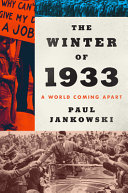2018 School Spending Survey Report
All Against All: The Long Winter of 1933 and the Origins of the Second World War
COPY ISBN
VERDICT Readers with an interest in reflective philosophical history will appreciate this book. Those looking for a more straightforward narrative of the period and how the two world wars relate might find Ian Kershaw’s To Hell and Back a better choice.
RELATED
ALREADY A SUBSCRIBER? LOG IN
We are currently offering this content for free. Sign up now to activate your personal profile, where you can save articles for future viewing




Comment Policy:
Comment should not be empty !!!